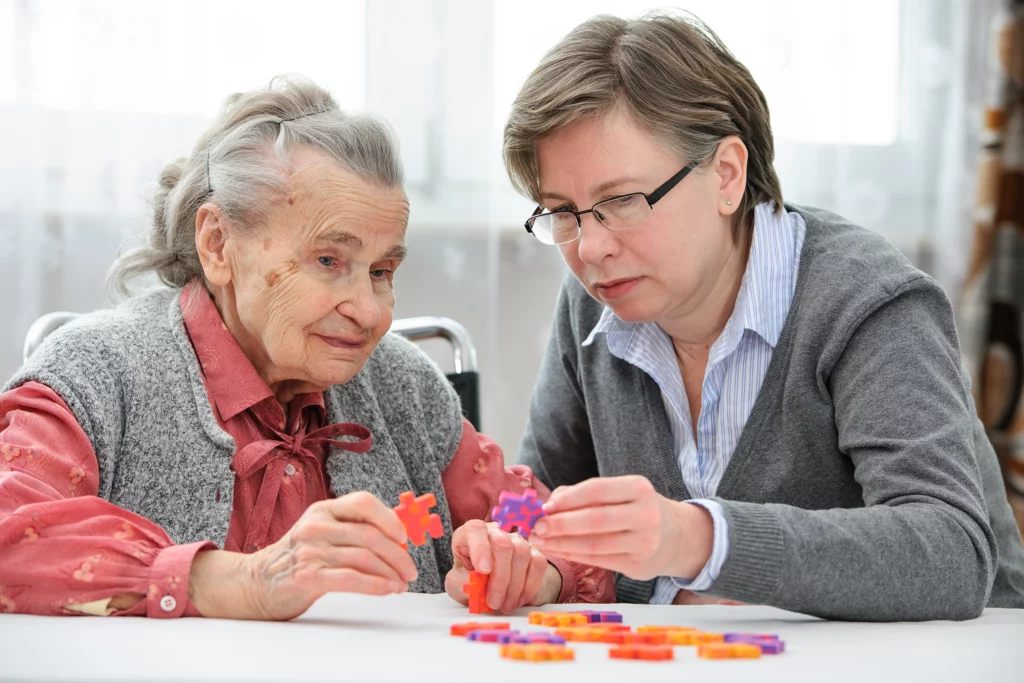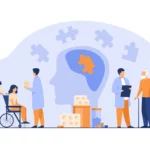
Lewy Body Dementia Stages – a Roller Coaster of Progression
This post may contain affiliate links or Google Ads and we may earn a small commission when you click on the links at no additional cost to you. As an Amazon Affiliate, we earn from qualifying purchases. This is at no additional cost to you and helps with our website expenses.
Lewy Body Dementia (LBD) is a neurological disorder that affects memory, thinking and behavior. It is the second most common form of dementia after Alzheimer’s disease and it can be difficult to diagnose. The Lewy Body Dementia stages don’t always follow a strict progression. They might go back and forth or skip from one to another. We will cover the basic stages to help you know what the stages might look like for you and your loved one.

The hallmark symptom of LBD is fluctuating cognition, which means that a person’s cognitive abilities come and go. People with LBD may experience memory problems, difficulty concentrating, visual hallucinations, changes in movement or balance, sleep disturbances and more.
REM sleep behavior disorder often starts years before any of the Lewy Body Dementia stages. REM sleep behavior disorder is characterized by vivid dreams and violent body movements that can be disruptive to sleep. People with this disorder may thrash around in their beds, shout out or have episodes of sleepwalking.
My husband had REM sleep behavior disorder for decades. After a sleep study a doctor diagnosed it as such and said he was more likely than others to develop Lewy Body Dementia.
Author
Lewy Body Dementia Stages Typically Follow a Seven Stage Path
Stage 1: Pre-disease
Stage one of Lewy Body Dementia (LBD) is a pre-disease phase in which individuals do not display any symptoms. During this stage, abnormal proteins known as Lewy bodies accumulate in the brain but are not yet having an impact on cognitive abilities or behavior. At this point, it is difficult to diagnose the condition, since there are still no visible signs of the disease.
Stage 2: Mild Cognitive Impairment (MCI)
In this stage, individuals may experience mild changes in memory and thinking ability. They may have difficulty with managing money or making decisions or exhibit some minor changes in behavior.
During this stage, individuals may experience mild changes in memory or thinking ability. This could manifest as not being able to use a television remote control, making decisions, and/or exhibiting minor changes in behavior such as increased apathy or irritability. Other signs of LBD may include decreased concentration and attention span, slower reaction times, and difficulty understanding instructions or conversing with others.
My husband’s first sign of stage two was not remembering the name of a store we went to quite often. He couldn’t grasp how to hang up a simple blind in one of our windows. We also noticed stiffness starting as he couldn’t put his arms behind his head. We weren’t alarmed in anyway, we just thought they were little incidents, possibly age related.
Author
Stage 3: Mild Dementia
The individual’s cognitive abilities decline further in this stage, leading to difficulties completing tasks that were previously easy for them to do. They may also have more pronounced problems with memory and behavior.
They may experience more pronounced problems with their memory, such as forgetting recently acquired information or having difficulty following conversations.
Furthermore, changes in behavior become much more pronounced at this stage, including increased confusion, agitation, depression and anxiety. In addition, visual and auditory hallucinations may begin to occur.
My husband seemed to go back and forth with stages. He stayed in stage two for some time then became much worse with symptoms more like stage four. He was hospitalized for months, went to rehab, and to a skilled nursing facility. He is now, with medication and exercise, back at stage two and has been there for almost two years now.
Author
Stage 4: Moderate Dementia with Behavioral Disturbances
During this stage, individuals are nearly completely dependent on others for their care. Memory and thinking skills continue to decline while motor symptoms like tremors and shuffling gait become increasingly prominent. The individual’s cognitive decline becomes more pronounced along with an increase in behavioral disturbances such as agitation and aggression.
Delusions, like thinking a spouse is cheating, may start at this time, if not before. Capgras syndrome also may raise its head here in stage four or before.
Stage 5: LBD with Severe Cognitive Decline
The individual’s cognitive abilities and behavioral disturbances continue to worsen. Memory and thinking abilities become severely impaired and the individual may not be able to remember even basic facts or follow conversations.
They may experience agitation, aggression, delusions, and hallucinations more often. They may also have difficulty controlling their emotions or movement, leading to physical outbursts such as hitting or kicking and trying to harm their caregivers. They might have prolonged crying spells that are hard to control.
Stage 6: Advanced Dementia
At this stage, the individual’s cognitive abilities deteriorate further and they lose their ability to recognize family members or participate in activities of daily living. Visual and auditory hallucinations are common and they may have a difficult time recognizing basic objects. The individual is completely dependent on others for their care.
Stage 6 of Lewy Body Dementia is characterized by a further deterioration in cognitive abilities. The person will experience more confusion, difficulty recognizing and interacting with family members, and difficulty participating in activities of daily living – such as washing, dressing, eating, and toileting.
In addition to this, the individual may have difficulty controlling their emotions or movements which can lead to physical outbursts such as hitting or kicking or trying to harm their caregivers.
Stage 7: Lewy Body Dementia Stages – Nearing the End
In the final stage of LBD, individuals become completely bedridden. Their speech becomes slurred and they lose the ability to communicate altogether. They may become unresponsive for long periods of time and eventually become completely unresponsive. This is the most severe stage of LBD and individuals at this stage may not live much longer.
The individual’s caregivers must provide them with round-the-clock care, as they are unable to take care of themselves in any way. During this stage, it is important for family members and caregivers to provide emotional support and comfort to the individual as their condition deteriorates.
Treatment and Moving Forward with the Lewy Body Dementia Stages
Treatment for LBD depends on the stage at which it’s diagnosed. In early stages, medications often used to treat Parkinson’s disease may be prescribed to manage some of the symptoms. As the condition progresses, other medications and treatments may be necessary to help with hallucinations, sleep disturbances, and other behavioral issues.
In addition, people with LBD can benefit from a variety of lifestyle changes including exercise, diet management, socialization and cognitive stimulation. It is also important to find support from family and friends who understand the condition and can provide emotional support.
Unfortunately, there is no cure for Lewy Body Dementia at this time. However, early diagnosis plays an important role in managing symptoms and improving quality of life. With proper care and treatment, people living with LBD (especially in the early stages) can still enjoy meaningful relationships and activities with the help of their loved ones.
It is important to note that not all individuals with Lewy Body Dementia will experience all seven stages outlined above. Each person’s experience will be unique, and some may exhibit only a few of these stages while others may go through all seven stages before passing away. Additionally, every individual’s decline varies. It is often described as a roller coaster.
Sources:
-https://www.alzheimers.org/understand-alzheimers/what-is-dementia/types-of-dementia/lewy-body
-https://mylbdcaregiverjourney.weebly.com/stages-of-lewy-body-disease.html




